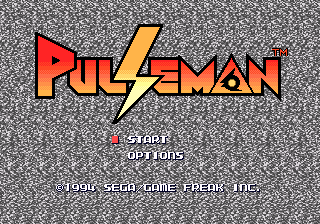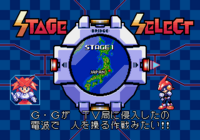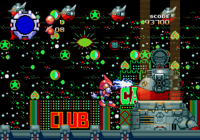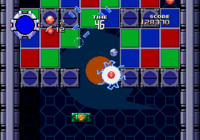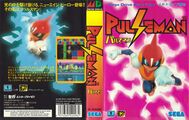Difference between revisions of "Pulseman"
From Sega Retro
m (→Items: fixed icon order) |
(added credits) |
||
| Line 152: | Line 152: | ||
Many of ''Pulseman<nowiki>'</nowiki>''s staff, including director [[wikipedia:Ken Sugimori|Ken Sugimori]] and composer [[wikipedia:Junichi Masuda|Junichi Masuda]], would go on to produce the world-renowned ''[[wikipedia:Pokémon|Pokémon]]'' series. | Many of ''Pulseman<nowiki>'</nowiki>''s staff, including director [[wikipedia:Ken Sugimori|Ken Sugimori]] and composer [[wikipedia:Junichi Masuda|Junichi Masuda]], would go on to produce the world-renowned ''[[wikipedia:Pokémon|Pokémon]]'' series. | ||
| + | |||
| + | ==Production credits== | ||
| + | {{multicol| | ||
| + | {{creditstable| | ||
| + | *'''Direction & Game Design:''' Ken Sugimori, Satoshi Tajiri | ||
| + | *'''Program:''' Junichi Masuda, Takenori Ohta, Michiharu Nisihasi, Tomomichi Ohta | ||
| + | *'''Graphics:''' Ken Sugimori, Motofumi Fujiwara, Atsuko Nisida | ||
| + | *'''Music & Sound Effects:''' Junichi Masuda | ||
| + | *'''Story Plot:''' Ryosuke Taniguchi | ||
| + | *'''Special Thanks:''' Akihito Tomisawa, Hiroshi Kawamoto, Naoko Kawakami, Kenji Matsusima, Dai Sato, Gento Matsumoto, Fumihiro Nonomura | ||
| + | © 1994 Sega/Game Freak | ||
| + | | source=In-game credits | ||
| + | | console=MD | ||
| + | }} | ||
| + | }} | ||
==Magazine articles== | ==Magazine articles== | ||
Revision as of 14:30, 19 March 2022
| Pulseman | ||||||||||||||||||||||||||||||
|---|---|---|---|---|---|---|---|---|---|---|---|---|---|---|---|---|---|---|---|---|---|---|---|---|---|---|---|---|---|---|
| System(s): Sega Mega Drive, Virtual Console | ||||||||||||||||||||||||||||||
| Publisher: Sega | ||||||||||||||||||||||||||||||
| Developer: Game Freak M2 | ||||||||||||||||||||||||||||||
| Sound driver: SMPS 68000 (modified) | ||||||||||||||||||||||||||||||
| Genre: Action[1][2] | ||||||||||||||||||||||||||||||
| Number of players: 1 | ||||||||||||||||||||||||||||||
| ||||||||||||||||||||||||||||||
Pulseman (パルスマン) is a Sega Mega Drive action platform game developed by Game Freak and published by Sega. Originally seeing a Japanese-exclusive release in July 1994, it was later brought to North America on Sega Channel in 1995, and eventually released worldwide on Nintendo Virtual Console in April 2007. Though the text of the game is in Japanese, the voice acting is in English.
In February 2007, fan translation group M.I.J.E.T. released an English translation of the game.[9]
Contents
Story
In 1999, the young scientist and computer engineer Doc Yoshiyama creates a "C-Life," an advanced artificial intelligence, named Amabilis. He fell in love with the C-Life girl he created and digitized and uploaded himself into the computer core to be with her. By combining his DNA and her program core, he created the half-human, half-C-Life boy named Pulseman. Because of his hybrid nature, Pulseman can freely travel between the real world and cyberspace. He also has the power to channel electricity through his body.
In 2015, the evil Doc Waruyama uses a system called EUREKA, which allows for C-Life beings to manifest in the human world, to establish the Galaxy Gang and use it to spread a new wave of cyber-terrorism across the world. Pulseman must put an end to this gang for the sake of the free world. Pulseman is assisted by his girlfriend Beatrice, a C-Life girl who used to be a member of the Galaxy Gang. Beatrice provides Pulseman with information about stages and items and warns him when his health is low.
The English Wii Shop description for the game states that Doc Yoshiyama becomes Doc Waruyama after living in the computer world for too long and becoming twisted and evil.
Gameplay
The game is a platformer. Pulseman moves with ![]() and
and ![]() and ducks with
and ducks with ![]() . His walk turns into a run after a short distance. He can perform a Lightning Dash with
. His walk turns into a run after a short distance. He can perform a Lightning Dash with ![]()
![]() or
or ![]()
![]() , which allows Pulseman to dash a short distance through enemies or over hazards. The Lightning Dash does not harm enemies or move through walls. He jumps with
, which allows Pulseman to dash a short distance through enemies or over hazards. The Lightning Dash does not harm enemies or move through walls. He jumps with ![]() . He can perform a somersault with
. He can perform a somersault with ![]() +
+![]() or
or ![]() +
+![]() that damages enemies. He does a short-ranged attack with
that damages enemies. He does a short-ranged attack with ![]() (or a kick with
(or a kick with ![]() +
+![]() ). He does a short jump (if not already in the air) and becomes briefly charged with energy with
). He does a short jump (if not already in the air) and becomes briefly charged with energy with ![]() , which can be used to attack enemies or jump onto wires. Pulseman turns into an energy ball when he jumps onto a wire. The player can use the D-pad to switch onto another nearby wire or press
, which can be used to attack enemies or jump onto wires. Pulseman turns into an energy ball when he jumps onto a wire. The player can use the D-pad to switch onto another nearby wire or press ![]() ,
, ![]() , or
, or ![]() to jump off the wire.
to jump off the wire.
Pulseman can enter a Sparkling State, in which he becomes imbued with electricity, by running, using the Lightning Dash, or collecting the Voltecc Energy item. While in the Sparkling State, his offensive abilities are upgraded. His basic attack becomes the Slash Arrow, a horizontal projectile, with ![]() . The Slash Arrow can penetrate multiple enemies. He can also perform the Voltteccer with
. The Slash Arrow can penetrate multiple enemies. He can also perform the Voltteccer with ![]() , where Pulseman turns into a ball of energy and launches at a 45-degree upward angle in the direction that he is facing. He bounces off walls, floors, ceilings, and the sides of the screen while in this state. He is invincible while in this state and damages any enemies that he collides with, though there are some enemies that can take him out of this state. The Voltteccer allows Pulseman to access areas that are normally inaccessible since it reaches higher than his jump, can break through certain blocks, can bounce off spikes, and can fit through narrow spaces. The state normally lasts a short time, but bouncing off surfaces extends its duration. Pulseman can stay in this state indefinitely if caught between surfaces, but he can exit the state manually with
, where Pulseman turns into a ball of energy and launches at a 45-degree upward angle in the direction that he is facing. He bounces off walls, floors, ceilings, and the sides of the screen while in this state. He is invincible while in this state and damages any enemies that he collides with, though there are some enemies that can take him out of this state. The Voltteccer allows Pulseman to access areas that are normally inaccessible since it reaches higher than his jump, can break through certain blocks, can bounce off spikes, and can fit through narrow spaces. The state normally lasts a short time, but bouncing off surfaces extends its duration. Pulseman can stay in this state indefinitely if caught between surfaces, but he can exit the state manually with ![]() ,
, ![]() , or
, or ![]() . The Slash Arrow and Voltteccer can both be done in the air after jumping. Pulseman loses the Sparkling State after using the Slash Arrow or Voltteccer, unless he has the Voltecc Energy item.
. The Slash Arrow and Voltteccer can both be done in the air after jumping. Pulseman loses the Sparkling State after using the Slash Arrow or Voltteccer, unless he has the Voltecc Energy item.
Pulseman cannot use his abilities in water, though he can still hit enemies at melee range with ![]() . Water dissipates his projectiles and interrupts his Voltteccer and Sparkling State.
. Water dissipates his projectiles and interrupts his Voltteccer and Sparkling State.
Pulseman's health is indicated by the color of the circle in the top-left corner of the screen. It is blue at full health but then turns yellow and finally red as he takes damage from enemies or hazards. If he takes additional damage while it is red, he loses a life.
Stages
The first three stages can be played in any order. After they have been completed, the next three stages open up and can also be played in any order. After all six stages have been completed, the final stage is played.
| Tokyo City | |
|---|---|
| Indian Forest | |
| Las Vegas | |
| Mechanical Ruins | |
| Alaska Range | |
| Coral Sea | |
| Techno Park 1 | |
| Techno Park 2 | |
Bonus Stage
In between stages, Pulseman plays a bonus stage where he uses his Voltteccer ability to try to break all the blocks before time runs out, similar to Breakout and Arkanoid. The player can move the paddle with ![]() and
and ![]() while Pulseman is in his energy ball form, which catches Pulseman and allows him to launch his Voltteccer again.
while Pulseman is in his energy ball form, which catches Pulseman and allows him to launch his Voltteccer again.
Items
| Spark Ball | |
|---|---|
| Collect 10 to earn an extra life. | |
| Life Up | |
| Restores Pulseman's health by one color. | |
| 1 Up | |
| Gives the player an extra life. | |
| Voltecc Energy | |
| Keeps Pulseman in the Sparkling State until he exits the current area or loses a life, allowing him to use the Slash Arrow and Voltteccer repeatedly. |
Development
In development, the game was originally known as Spark.
Many of Pulseman's staff, including director Ken Sugimori and composer Junichi Masuda, would go on to produce the world-renowned Pokémon series.
Production credits
- Direction & Game Design: Ken Sugimori, Satoshi Tajiri
- Program: Junichi Masuda, Takenori Ohta, Michiharu Nisihasi, Tomomichi Ohta
- Graphics: Ken Sugimori, Motofumi Fujiwara, Atsuko Nisida
- Music & Sound Effects: Junichi Masuda
- Story Plot: Ryosuke Taniguchi
- Special Thanks: Akihito Tomisawa, Hiroshi Kawamoto, Naoko Kawakami, Kenji Matsusima, Dai Sato, Gento Matsumoto, Fumihiro Nonomura
© 1994 Sega/Game Freak
Magazine articles
- Main article: Pulseman/Magazine articles.
Promotional material
Physical scans
| Sega Retro Average | ||||||||||||||||||||||||||||||||||||||||||||
|---|---|---|---|---|---|---|---|---|---|---|---|---|---|---|---|---|---|---|---|---|---|---|---|---|---|---|---|---|---|---|---|---|---|---|---|---|---|---|---|---|---|---|---|---|
|
| 69 | |
|---|---|
| Based on 8 reviews | |
Technical information
ROM dump status
| System | Hash | Size | Build Date | Source | Comments | |||||||||
|---|---|---|---|---|---|---|---|---|---|---|---|---|---|---|
| ✔ |
|
2MB | 1994-05 | Cartridge (JP) |
External links
- Sega of Japan Virtual Console pages: Mega Drive
- Nintendo catalogue pages: US, AU
- English translation by M.I.J.E.T. at Minimalist Jettison
- Pulseman Japanese to English manual translation at www.vgcomplete.com
References
- ↑ File:Pulseman MD JP Box.jpg
- ↑ 2.0 2.1 https://sega.jp/history/hard/megadrive/software.html (Wayback Machine: 2020-07-20 09:51)
- ↑ 3.0 3.1 http://www.nintendo.com/games/detail/e08urZgh9BnSoSUqah5__X6jCdYr9Wmg (Wayback Machine: 2010-11-22 22:48)
- ↑ 4.0 4.1 http://www.nintendolife.com/games/megadrive/pulseman (Wayback Machine: 2017-06-25 01:48)
- ↑ https://www.nintendo.fr/Jeux/Console-virtuelle-Wii-/Pulseman--278645.html (archive.today)
- ↑ https://www.nintendo.co.jp/wii/vc/software/03.html (Wayback Machine: 2018-03-06 00:26)
- ↑ http://vc.sega.jp:80/vc_pulseman/ (Wayback Machine: 2007-04-27 10:15)
- ↑ http://www.nintendo.com.au/index.php?action=catalogue&prodcat_id=41&prod_id=19761&pageID=4 (Wayback Machine: 2012-04-03 01:30)
- ↑ https://www.romhacking.net/translations/1099/
- ↑ 1700 igr dlya Sega, "" (RU; 2001-xx-xx), page 242
- ↑ Beep! MegaDrive, "August 1994" (JP; 1994-07-08), page 21
- ↑ Famitsu, "1994-07-29" (JP; 1994-07-15), page 1
- ↑ Mega, "September 1994" (UK; 1994-08-18), page 56
- ↑ Mega Fun, "10/94" (DE; 1994-09-21), page 64
- ↑ Sega Pro, "October 1994" (UK; 1994-09-08), page 58
- ↑ Sega Saturn Magazine, "September 1995" (JP; 1995-08-08), page 85
- ↑ Tricks 16 bit, "Tricks Sega Gold 800 igr" (RU; 1998-03-20), page 139
| Pulseman | |
|---|---|
|
Main page | Maps | Hidden content | Development | Magazine articles | Reception | Region coding | Technical information | Bootlegs
| |
- 1 player games
- JP Mega Drive games
- All JP games
- Mega Drive games
- 1994 Mega Drive games
- All 1994 games
- Mega Drive action games
- All action games
- JP Wii Virtual Console games
- US Wii Virtual Console games
- All US games
- EU Wii Virtual Console games
- All EU games
- AU Wii Virtual Console games
- All AU games
- Wii games
- 2007 Wii games
- All 2007 games
- Wii Virtual Console games
- Old content rating field
- All games
- Credits without reference
- Old technical information
- Pulseman
- Sega Channel games
